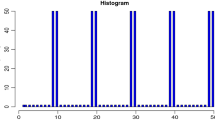Abstract
In this paper we consider stochastic programming problems where the objective function is given as an expected value function. We discuss Monte Carlo simulation based approaches to a numerical solution of such problems. In particular, we discuss in detail and present numerical results for two-stage stochastic programming with recourse where the random data have a continuous (multivariate normal) distribution. We think that the novelty of the numerical approach developed in this paper is twofold. First, various variance reduction techniques are applied in order to enhance the rate of convergence. Successful application of those techniques is what makes the whole approach numerically feasible. Second, a statistical inference is developed and applied to estimation of the error, validation of optimality of a calculated solution and statistically based stopping criteria for an iterative alogrithm. © 1998 The Mathematical Programming Society, Inc. Published by Elsevier Science B.V.
Similar content being viewed by others
References
Y. Ermoliev, Stochastic quasi-gradient methods and their application to systems optimization, Stochastics 4 (1983) 1–37.
Y. Ermoliev, R.J.B. Wets (Eds.), Numerical Techniques for Stochastic Optimization. Springer, Berlin, 1988.
J.L. Higle, S. Sen, Stochastic decomposition: An algorithm for two-stage linear programs with recourse, Mathematics of Operations Research 16 (1991) 650–669.
G. Infanger, Planning under Uncertainty, Solving Large Scale Stochastic Linear Programs, Boyd & Fraser Publishing Company, MAs, USA, 1994
E.L. Plambeck, B.R. Fu, S.M. Robinson, R. Suri, Sample-path optimization of convex stochastic performance functions, Mathematical Programming, Series B 75 (1996) 137–176.
R.Y. Rubinstein, A. Shapiro, Discrete Event Systems: Sensitivity Analysis and Stochastic Optimization by the Score Function Method, Wiley, New York, 1993.
G. Dantzig, Linear programming under uncertainty, Management Science 1 (1955) 197–206.
E. Beale, On minimizing a convex function subject to linear inequalities, Journal of the Royal Statistical Society Series B 17 (1955) 173–184.
J. Dupačová, Multistage stochastic programs: The state-of-the-art and selected bibliography, Kybernetika 31 (1995) 151–174.
P. Kall, S.W. Wallace, Stochastic Programming, Wiley, Chichester, 1994.
R. Wets, Stochastic programming: solution techniques and approximation schemes, Mathematical Programming: The State-of-the-Art 1982, Springer, Berlin, 1983 pp. 566–603.
R. Wets, Stochastic programs with fixed recourse: the equivalent deterministic program, SIAM Review 16 (1974) 309–339.
G. Gürkan, A.Y. Özge, S.M. Robinson, Sample-path optimization in simulation, Proceedings of the 1994 Winter Simulation Conference, 247–254.
R.Y. Rubinstein, A. Shapiro, Optimization of static simulation models by the score function method, Mathematics and Computers in Simulation 32 (1990) 373–392.
R.T. Rockafellar, R.J.-B. Wets, On the interchange of subdifferentiation and conditional expectation for convex functionals, Stochastics 7 (1982) pp. 173–182.
R.Y. Rubinstein, Sensitivity analysis of discrete event systems by the push-out method, Annals of Operations Research 39 (1992) 229–250.
R.Y. Rubinstein, A. Shapiro, On optimal choice of reference parameters in the likelihood method, Proceedings of the 1992 Winter Simulation Conference, 1992, pp. 515–520.
W. Römisch, R. Schultz, Stability of solutions for stochastic programs with complete recourse. Mathematics of Operations Research 18 (1993) 590–609.
A. Shapiro, Y. Wardi, ‘Convergence analysis of stochastic algorithms’, Mathematics of Operations Research 21 (1996) 615–628.
R.J. Muirhead, Aspects of Multivariate Statistical Theory, Wiley, New York, 1982.
J.L. Higle, S. Sen, Statistical verification of optimality conditions for stochastic programs with recourse, Annals of Operations Reserach 30 (1991) 215–240.
A.M. Mathai, S.B. Provost, Quadratic Forms in Random Variables: Theory and Applications, Dekker, New York, 1992.
T. Robertson, F.T. Wright, R.L. Dykstra, Order restricted Statistical Inference, Wiley, New York, 1988.
A. Shapiro, Towards a unified theory of inequality constrained testing in multivariate analysis, International Statistical Review 56 (1988) 49–62.
A. Shapiro, Asymptotic analysis of stochastic programs, Annals of Operations Research 30 (1991) 169–186.
A.J. King, R.T. Rockafellar, Asymptotic theory for solutions in statistical estimation and stochastic programming, Mathematics of Operations Research 18 (1993) 148–162.
A. Shapiro, Asymptotic behavior of optimal solutions in stochastic programming, Mathematics of Operations Research 18 (1993) 829–845.
A.V. Fiacco, G.P. McCormick, Nonlinear Programming: Sequential Unconstrained Minimization Techniques, Wiley, New York, 1968.
M.S. Bazaraa, H.D. Sherali, C.M. Shetty, Nonlinear Programming: Theory and Algorithms, Wiley, New York, 1993.
P.L'Ecuyer, G. Yin, Budget-dependent convergence rate of stochastic approximation, Preprint.
A. Shapiro, Simulation based optimization — convergence analysis and statistical inference, Stochastic Models 12 (1996) 425–454.
J.L. Higle, S. Sen, Duality and statistical tests of optimality for two stage stochastic programs, Mathematical Programming, Series B 75 (1996) 257–275.
A. Shapiro, Y. Wardi, Nondifferentiability of the steady-state function in Discrete Event Dynamic Systems, IEEE Transactions on Automic Control 39 (1994) 1707–1711.
Author information
Authors and Affiliations
Additional information
Supported by CNPq (Conselho Nacional de Desenvolvimento Científico e Tecnológico), Brasília, Brazil, through a Doctoral Fellowship under grant 200595/93-8.
Rights and permissions
About this article
Cite this article
Shapiro, A., Homem-de-Mello, T. A simulation-based approach to two-stage stochastic programming with recourse. Mathematical Programming 81, 301–325 (1998). https://doi.org/10.1007/BF01580086
Received:
Revised:
Issue Date:
DOI: https://doi.org/10.1007/BF01580086




